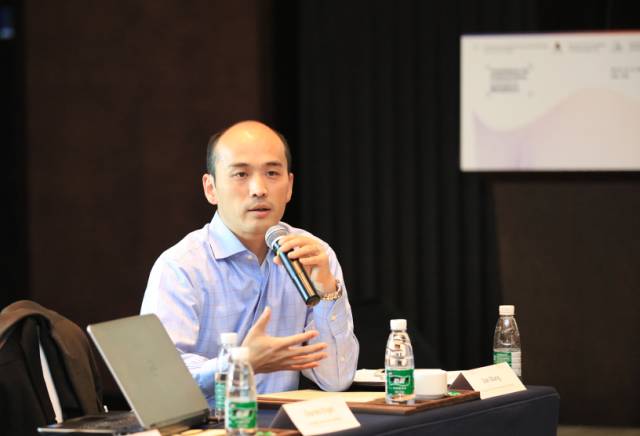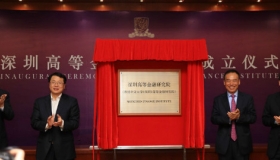SME Assistant Dean Jian Wang Honored with Pushan Award for Outstanding World Economics Thesis
Mr. Jian Wang, Professor and Assistant Dean of the School of Management and Economics of The Chinese University of Hong Kong, Shenzhen (“University”), has shared Pushan Award with Professor Xiao Wang (a co-author) for an excellent world economics thesis. This award is listed as an equally important academic research award as “Sun Yefang Award on Economics and Science.” The award promotes original academic research results and policy studies on world economy, open macroeconomics, international finance, international trade, international economic development and growth, and China’s foreign economic relationships.
Introducing Professor Jian Wang

Mr. Jian Wang is assistant (academic) dean of the School of Management and Economics of The Chinese University of Hong Kong, Shenzhen. He is also a tutor for students pursuing Masters of Science in Finance at PBC School of Finance, Tsinghua University and a member of China Finance 40 Forum.
After obtaining his Ph.D. in Economics from the University of Wisconsin-Madison, Professor Wang worked as a senior research economist and advisor at the Federal Reserve Bank of Dallas. His primary research interests include international finance and monetary economics. He has long worked on global (including China) hot economic topics and the huge impact on new emerging economies caused by central bank (such as the Federal Reserve Bank)’s non-conventional monetary policies (zero interest rate, QE, and twist operation).
In 2013, Professor Wang published a book Demistyfing the Fed, detailing the structure, selection of officials and decision-making procedures of the organization. It has been deemed a must read for China’s finance professors and senior government officials in charge of economic affairs.
Introducing Pushan Award
Pushan Award for Excellent World Economics Thesis (Pushan Award, for short) aims to commemorate the late professor Pu Shan, an eminent figure and forerunner in China’ s world economic studies and push forward Pu’s lofty idealism, spirit of selfless devotion, and indifference to personal reputation and interests. It also aims to reward Chinese scholars who author original and excellent theses on world economic studies, especially on international finance, international trade, international economics as well as China’s foreign economic relations. China Society of World Economics (CSWE) and Shanghai Pushan New Finance Development Foundation (上海浦山新金融发展基金会) set up Pushan Award to meet the urgent needs for research on world economics. It has become one of the top world economic awards in China thanks to its authority of experts, rigorous procedures for selection and internationalization of the appraisal scheme.
Thesis Abstract
Benefits of foreign ownership: Evidence from foreign direct investment in China
To examine the effect of foreign direct investment, this paper compares the post-acquisition performance changes of foreign- and domestic-acquired firms in China. Unlike previous studies, we investigate the purified effect of foreign ownership by using domestic-acquired firms as the control group. After controlling for the acquisition effect that exists in domestic acquisitions, we find no evidence that foreign ownership can bring additional productivity gains to target firms, though both foreign and domestic acquisitions bring productivity improvements to target firms. In contrast, a strong and robust finding is that foreign ownership significantly improves target firms' financial conditions and exports relative to domestic-acquired firms. Foreign acquisition is also found to improve output, employment and wages for target firms. These findings conflict with the conventional view of productivity-driven FDI and highlight the financial channel through which FDI benefits the host countries.

Interviewing Professor Jian Wang
Q1 Hello, Professor Wang. First, allow me take this opportunity to congratulate you on your winning Pushan Award. My first question is why you chose FDI effect on China as your research topic.
A: Over thirty years since China opened its door to the outside world, FDI has played a significant though controversial role in China’s economy. Whether or not FDI facilitates a nation’s economic development remains in dispute. Mainstream views believe that FDI is technology-driven, while previous disputes focused on technology and management models.
However, it is in our opinion that new emerging economies have important finance markets in addition to technology markets. Finance markets in these regions are yet to be developed. Furthermore, quite a few nations set up limitations on finance markets and foreign investment, particularly foreign banking industry. Consequently, foreign investment circumvented these restrictions through FDI, providing capital to businesses in these countries. That is how I came up with the idea and fortunately, China has accumulated data on general industry survey, by which we may gauge the difference between these two channels to determine whether it is technology-driven or capital investment-driven.
Q2 Why did you use domestic-acquired firms as the controlling group?
A: Previous textbooks would tell you that FDI actually boosted productivity; however, there exists an internal issue. In other words, it is also likely that FDI attracts efficient workers or managers. Therefore, technology may not be the primary reason for productivity improvements. We need a controlling system to eradicate such issue.
Q3 Have you encountered any problems in your investigation?
A: Certainly, I have. The biggest problem is data, which takes a long time to sort out through complex procedures. Secondly, this is a nascent view and few would like to accept it. Once we sent our paper to a magazine and one of the reviewers thought that this issue seemed to be China specific and wonder how we could prove that it would contribute to world economics. Coincidently a professor at University of Chicago had data on 15 new emerging economies and they had come to a similar conclusion. That is how our findings have touched on economic issues facing the entire emerging markets.
Q4 As freshmen, we will face academic research problems. Do you have any suggestions on how to write a thesis?
A: First, you need to have a framework under which to draft your paper or conduct your research. Many Chinese students are unnecessarily obsessed with technical details. I suggest you make a literature tree, a structure where you may initially put in one or two papers, but as time goes by, new research reports come out. You need to find out the relationship between the new results and those founding literatures, the correlations among these extended research results, and the reasons that have brought about different conclusions. Only when you sort out these messy issues will you be able to find your foothold, conduct your own research and attempt to solve your problems.




